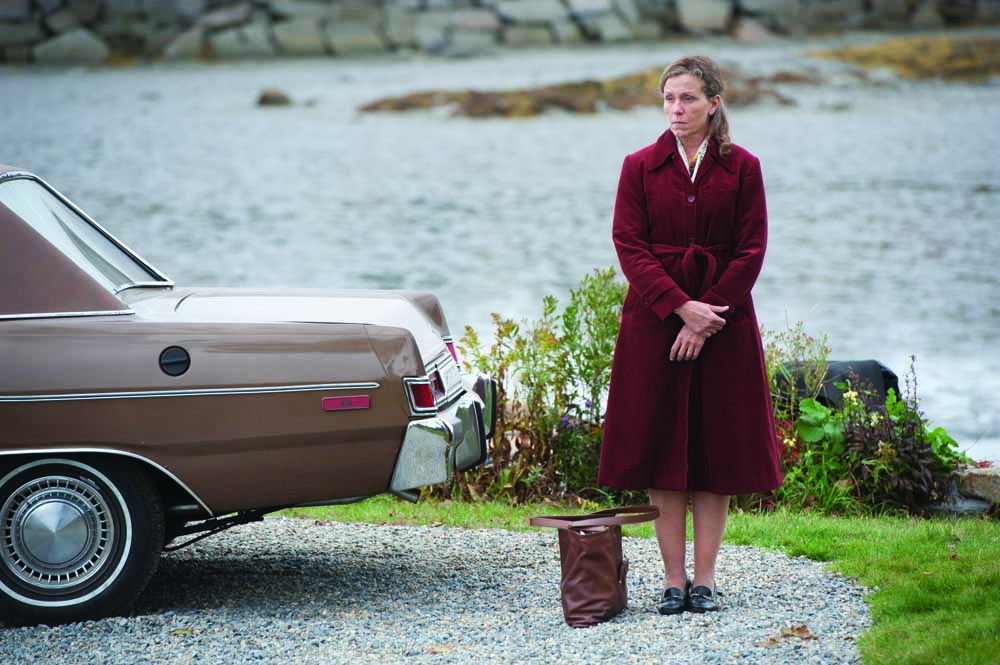‘Olive Kitteridge’: an unlikely heroine
Published 12:00 am Saturday, November 1, 2014

- Frances McDormand stars in the miniseries “Olive Kitteridge,” premiering Sunday on HBO. The series is based on a Pulitzer Prize-winning novel by Elizabeth Strout. HBO Submitted photo
The first glimpse of the heroine of the miniseries “Olive Kitteridge” is of her calves: thick and mottled above worn, flat shoes, trudging slowly and purposefully through fallen leaves.
What happens shortly after those legs come to a halt is startling, even though it isn’t actually in the original book by Elizabeth Strout. But this HBO adaptation of her Pulitzer Prize-winning novel of the same title is so respectful and gracefully done that big inventions and small omissions don’t stand out or disappoint.
“Olive Kitteridge,” directed by Lisa Cholodenko, is a rare treasure, a measured, understated portrait of a marriage that finds poetry in the most prosaic of settings and circumstances: flinty, stolid citizens of a small, insular town in coastal Maine. There is no glamour and little romance, yet there is a fine-grained mystery to the most ordinary, blunted lives.
The show’s tagline is “There’s no such thing as a simple life,” and it lives up to it by dividing the series into four parts, shown two at a time on Sunday and Monday. And four hours still doesn’t cover the whole tale, which spans 25 years and was really a skein of short stories raveled around the title character, Olive.
Frances McDormand (“Fargo”) doesn’t fit the physical description of Olive, who in the book is tall and stoutly built, but this actress, whether playing Olive as a strict, crabby math teacher and caustic wife, or, later, as a judgmental grandmother and caustic loner, manages to convey a certain bulkiness that could be extra weight, or maybe just the heroine’s heaviness of heart.
It takes time to see what is eating at Olive — and causing her sudden flashes of icy rage — but it’s pretty clear from the start that she is no day at the beach. Plenty of shows focus on women who are unlikely heroines; Olive is an unlikely heroine who at first is almost comically unlikable.
Her husband, Henry (Richard Jenkins), a pharmacist, is mild, accommodating and kind, the sort of man who buys his wife a heart-shaped box of chocolates for Valentine’s Day and doesn’t flinch when she declines even to look in his direction. When he later finds his loving card in the trash, he expresses dismay that she didn’t want to keep it. “I already read it,” she replies tersely.
They have a son, Christopher (Devin McKenzie Druid), who mopes through his parents’ tense, spiky marriage. Henry, sweet and conciliatory, is the easier parent to like, but being a teenager, Christopher occasionally flashes a complicit smirk at his mother’s crueler wisecracks.
Olive is intelligent and has a sense of humor, but anger and a savage disdain for stupid people, or “dopes” and “saps” as she calls most of them, disguise her wit.
She says depression runs in her family. “Happy to have it,” she says. “Goes with being smart.”
And the few people Olive respects share her inner sadness, including Jack Kennison, a lonely widower played by Bill Murray. Olive is often horrible to her husband, but Henry is good to everyone, and he is especially generous to sweet, guileless people like himself. He takes a particular shine to Denise (Zoe Kazan), a plain, timorous but eager young woman he hires as a clerk in the pharmacy. What he sees as her childlike good nature is such a tonic compared with Olive that he laughs helplessly at even her silliest little stories.
Olive is a rescuer, too, but in a very different way, one that matches a terrain where winter is bleak and even spring has some harshness in its bloom. The cinematography follows the cues of the novel: When the snow melted, “rhododendrons screeched their red heads at the world.”
Olive can be spectacularly rude (she eats peanuts during her son’s wedding ceremony), but she is specially attuned to smart, damaged people. When Kevin (Cory Michael Smith), a former math student whose mother was mentally ill, returns to town as a clear and present danger to himself, Olive alone sees his distress and does something about it.
It is a heroic rescue that goes unnoticed and unheralded, and is all the more winning because of it.
Bad things happen to Olive when she tries to help herself. But when she helps others, even unwittingly, things look up. Even at her best, though, there isn’t much charm to her manner, as when she comes to the aid of a man who collapses on a wooded trail. She stands over him as if he were an abandoned suitcase. “Are you dead?” she says.
He isn’t. He only wishes he were, and that is the baseline of living in Olive’s world.






